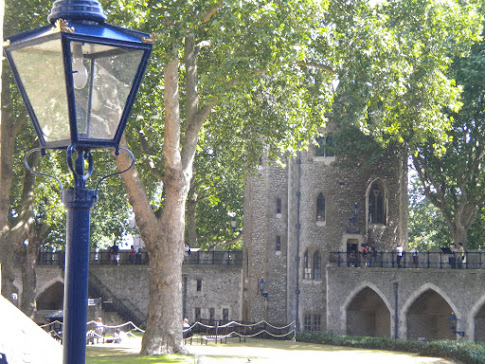

You notice something is different about the Barbican Public Library as soon as you walk onto the grounds of the building. It is housed in a complex that also contains a popular movie theatre, art gallery, as well as a music and theatre stage. The Barbican is not hidden within a non-descript building obvious only to true die-hard patrons, it is big and beautiful, and crying out to be used.
This is a great reflection of how England views its public libraries. People value reading here in a way that I have never seen in the United States. There is no stigma attached to reading or in using the services that public libraries offer. In fact, it is a bad reflection on the individual who DOESN'T read rather than a stigma for the person for whom reading is a pleasure. This difference may be due to the rich literary history of this country. Maybe it has to do with the education system. Personally, I think it is a combination of both.
At the moment, the Barbican is running an audiobook promotion. While the current promotion is directly addressed to their sight impaired patrons, the library also realizes that audiobooks have become a popular choice for many of their patrons, especially commuters. With as much time as one spends on public transportation in London, audiobooks are a great distraction from the crowds and noise of the buses and tube.
The Barbican also offers a brilliant service to those patrons for whom public transportation is not an issue-the severely disabled and elderly. These patrons are eligible for free home delivery.
I was fortunate enough to be able to sit in on an interview with Ms. Pote, the enquiries librarian on staff on the day of our visit, and my colleague Allison. Ms. Pote explained that while the service may be novel to us, it was something that the library felt was necessary in order to fulfill their mission. "We owe people a service. If they can't come to us, we must go to them." I was impressed at the commitment of the library to reach out to all patrons, even if that meant librarians sometimes had to go out of their way or make a personal delivery for it to happen.
Ms. Pote also made another interesting differentiation in our discussion. She would not call herself a reference librarian (as she would be considered in the United States), but an enquiries librarian. Only the librarians who work at Guildhall Library (the main public research library) can call themselves reference librarians. I did not understand this to mean that they had more education. The differentiation was made upon the intensity of the questions being asked. Ready reference questions can be answered at all London public libraries, but patrons who require any type of research question or have more complicated questions are referred to Guildhall.
Our conversation also covered current topics and trends in public libraries. The libraries of England are seeing many of the same trends as libraries in the United States. Reference desks are being removed in favor of roaming librarians, talking is not being hushed, libraries are reorganizing space for a more aesthetically pleasing and productive environment, and they have begun using a 24/7 internet librarian system that allows patrons access to a reference librarian at any time.
For all of our similarities, there is one major difference that I am having a hard time wrapping my head around. English libraries charge for most rentals. Adults are allowed up to 12 books and children 8 at no charge, and educational materials (as deemed by the library) are unlimited and free of charge. However, all other items in the collection have an associated fee. As a U.S. librarian, I cringe at this because I feel free access is essential to our mission. It is the great equalizer. Anyone has the right to access anything they can find in our collection and as long as you return it on time, there is no fee. This benefit is even greater in city or statewide networks because your sources for information and materials multiplies.
I understand that libraries have overhead and that this is one way to ensure that your collection will be able to continue to grow despite times of budget hardships, as both American and British libraries now face. Also, there are cultural differences in library philosophy. However, this difference makes me appreciate the U.S. system that much more because of our unique focus on the freedom to access information for all. Of course, I also hope that we can someday boast the same type of pride and exercise the pleasure of reading for reading's sake as do the British. Once we have mastered that, our libraries will never again be endangered for lack of appreciation to the benefits they offer the community.
The Barbican was a great introduction to British public libraries. We have much to learn from them if we wish to cement our place as community centers, research aides, and entertainment specialists. I have taken many things from my visit that will make me a better librarian. I hope that my continued research into the philosophies and organization of British public libraries will only serve to strengthen the connections between patron and library that will allow us to formulate best practices that will help us move into a new generation of library services.
For more information about the Barbican Public Library, click here.

No comments:
Post a Comment